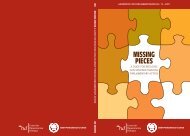Les femmes rwandaises et la campagne électorale - Inter ...
Les femmes rwandaises et la campagne électorale - Inter ...
Les femmes rwandaises et la campagne électorale - Inter ...
Create successful ePaper yourself
Turn your PDF publications into a flip-book with our unique Google optimized e-Paper software.
Rwandan Women and the Electoral Campaign • 30 - 31 July 2003<br />
The Electoral Campaign: Candidates' Capacity Audit<br />
Ms Phoebe Asiyo, Constitutional Commissioner,<br />
Chairperson of the Women’s Political Caucus, Kenya<br />
Introduction<br />
By the end of this session, you should be able to c<strong>la</strong>rify your reasons for entering into elective politics and apply<br />
problem analysis in deciding your party, constituency and general strategy. The decision to run for public office is<br />
made early in the election chain and only after considering a number of factors. This session will take you<br />
through a number of the most critical factors to be taken into account when deciding to run. It will also give you<br />
some assessment criteria, which you can use in deciding wh<strong>et</strong>her or not you are ready to run for office.<br />
Factors to consider<br />
Before making the decision to run, you must first and foremost size-up the constituency and the national<br />
environment you will be operating in. In so doing, you must ask the fundamental question: "What other choices<br />
are going to be made by the voters I want to woo?" These choices will som<strong>et</strong>imes d<strong>et</strong>ermine your victory or <strong>la</strong>ck<br />
of it. For instance, if the voters will be electing a President as well, the dominant Presidential candidate in your<br />
constituency is critical to your bid.<br />
Your personal assessment must be made against the background of your environment. This should tell you if you<br />
are up to it or not. There are many factors to consider, but we have iso<strong>la</strong>ted eight of these here.<br />
Reasons for running<br />
Your reasons for running have to be clear in your mind from the outs<strong>et</strong>. Your campaign messages should be<br />
developed around your reasons. But remember, your reasons for running must have an element of selfishness.<br />
According to one political philosopher, good politicians must have "selfishness, selfishness and selfishness". To<br />
this philosopher, selfishness is a virtue in politics. In other words, a good candidate is one who admits that her<br />
ambition for political office is the main driving force in her campaign. This will provide a campaign with sufficient<br />
imp<strong>et</strong>us as opposed to candidates who believe that they are running for office to serve the community. Service to<br />
the community is what you do after the election.<br />
Your political capital<br />
How much are you worth? If votes were money, what would your price tag be? Consider the following aspects:<br />
• Your level of influence in the constituency;<br />
• Your position as a leader at the level of national politics, the corporate or business sector, development<br />
sector, civil soci<strong>et</strong>y, <strong>et</strong>c.<br />
• Your past political experience;<br />
• The groups you can count on for support at the constituency level;<br />
• You re<strong>la</strong>tionship with political party leadership;<br />
• Your leadership record.<br />
Family Support<br />
Does your family support your decision to run? Does it have the stamina to sustain the rigours of an election<br />
campaign?<br />
63

















